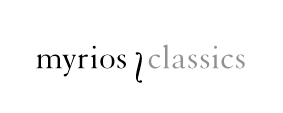“Today, a memorial is not anymore carved in stone – it is released as a record.”
Frankfurter Allgemeine Zeitung
Looking back over the last 15 years, I couldn't imagine a better start for my label myrios. With just two unfinished productions in my pocket, I travelled to Midem in Cannes, the only music trade fair of any significance at the time, on the off-chance that I would find distributors for the project. All I had in my luggage were my ideas for a new classical label and a few preliminary layouts for the albums. I thought that no one would ever be interested if there was no physical product to touch. But the feedback was overwhelming. Suddenly there were distributors all over the world and the two albums went to the pressing plant. One of them was SOLO, Tabea Zimmermann's debut album on myrios. It quickly became one of the most successful and best-selling albums in the rather smaller niche of the solo viola repertoire. It was praised by music-loving listeners and journalists alike. In October 2010, it received an ECHO Klassik award, and Tabea Zimmermann was named Instrumentalist of the Year for SOLO.
The idea of producing recordings with almost no compromises had been in my head for a long time, and I was looking for artists who thought the same way. As a freelance sound engineer and producer for other labels, I had often experienced situations in which the financial pressure of the executive producer was passed on to the artists. Rarely can this create an artistically productive working environment. However, making a quality album is a very emotionally intense and challenging situation for an artist. He or she has to combine all their talent to set nothing less than a personal milestone, a benchmark that represents the artistic level at a certain point in their career and which - in the best case - lasts for decades. But the more the industry crisis of the noughties cast its shadow, the more the focus shifted to figures that were expected as minimum sales but had now become completely unrealistic. These expectations weighed heavily on the shoulders of those responsible and their artists, often even before the first bar of music was recorded. In a panic to save money, the record companies got rid of all their "ballast": competent employees, long-standing producers – and a number of outstanding artists who had the misfortune of not selling well enough. Some of these artists somehow survived these years under the mantle of their record company, which suspiciously managed every cent of a production and preferred to focus on calculated success rather than artistically interesting projects. As a result, recording sessions were often scheduled too tightly and without much advance notice. Recording a heavy work on just two days off in the middle of a world tour? No problem...
In the meantime, the absence of the sacked employees, with whom the artists had built up a (trusting) relationship over many years, became painfully clear to everyone. With literally every phone call, a new contact person came into play. Some artists whose sales figures fell below a more or less arbitrarily set mark in an Excel sheet were shown the door, no matter what proportion of our musical heritage their recorded art represented. Perhaps because their repertoire was indeed under-selling, or perhaps because their faces seemed too old to represent the image of a label constantly desperate for new, "fresh" faces.
Fortunately, times have changed and the industry is doing better, despite (or thanks to?) streaming. Some labels have learnt their lesson and reinvented themselves as a home for great artists. Some may never manage to shed their old image. Either way, the crisis, and how the industry dealt with it, was a great opportunity for smaller labels to fight for a place in the music landscape, to create great productions together with great artists. I am very proud that my label myrios classics is seen as such, by artists, journalists and listeners alike And I feel very honoured that so many outstanding artists put their trust in our work. The name myrios is Greek and means "infinity". Nothing would please me more than if some of our recordings were to find their place in the circle of "records for eternity".
Yours,
Stephan Cahen
